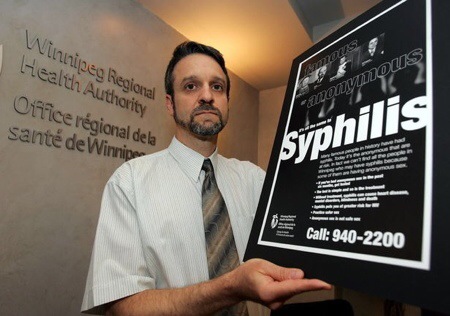A syphilis outbreak among Winnipeg men is being blamed on casual, anonymous sex facilitated by online hookups.
The Winnipeg Regional Health Authority is concerned about the resurgence of syphilis, a sexually transmitted illness virtually eradicated from North America in the 1990s.
In September, the WRHA sounded an alarm about syphilis when the number of monthly reports doubled from two to four. But the number of reports appears to be increasing in Winnipeg, as it has in recent years in other North American cities.
Twelve new cases were reported in Winnipeg in March alone, said WRHA medical officer of health Joss Reimer. This is the highest number of cases of syphilis cases reported in any month in Winnipeg since the mid-1980s, before safe-sex education spurred on by the HIV epidemic began to reduce the incidence of all sexually transmitted illnesses.
Almost all the recent cases involved gay or bisexual men. The common vector appears to be online hookups, which poses an epidemiological challenge to public-health nurses trying to track down people who may have been exposed to syphilis or may have spread it.
“There’s a lot more anonymous sex and a lot more access to a larger variety of people. This is certainly consistent (with) how people are communicating with each other,” Reimer said.
No single social-media application has been blamed for the outbreak. Men contracting syphilis have cited the use of a variety of websites and applications, including Tinder, Grindr, Scruff, Squirt, Plenty of Fish and Facebook, she said.
Syphilis outbreaks in Winnipeg in 2003 and 2005 were eventually traced back to specific geographic places, such as nightclubs, Reimer said.
This latest outbreak is proving difficult for public-health nurses, who have been forced to go on social-media sites to attempt to track down people known only by their online pseudonyms.
“This has made it really tricky to do followup,” Reimer said. “We often don’t have a name. We often only know the screen names.”
While most of the cases involve men, some of these men have sex with women as well, Reimer said. Syphilis may be more difficult to notice in women because the initial sore appears at the point of infection, which can be difficult to detect if it occurs in an internal location.
While syphilis can be treated effectively with antibiotics, the longer it goes untreated, the more serious the health consequences. Left untreated, syphilis can eventually cause dementia or even kill its host, albeit only after 10 to 20 years.
Children born with syphilis, however, can suffer lifelong effects that may not be mitigated through treatment. “We’re always extra-concerned when it comes to the possibility of a congenital case,” Reimer said.
As a result, the Winnipeg Regional Health Authority is urging anyone who’s sexually active — men and women, gay and straight — to use condoms, get tested for syphilis and pay attention to their private parts.
“Syphilis can be tricky for guys to spot. There might be sores around the infected area, but they might not be painful and may come and go on their own,” WRHA medical officer of health Pierre Plourde wrote in an op-ed piece in the May issue of Outwords, a Winnipeg GLBT publication. “Symptoms could also disappear entirely until flu-like symptoms show up a couple of months later.”
The WRHA has also launched a syphilis-awareness campaign on social-media sites.








 TrafficHolder.com - Buy & Sell Adult Traffic
TrafficHolder.com - Buy & Sell Adult Traffic
Bogus sex-panic alert #3,472.